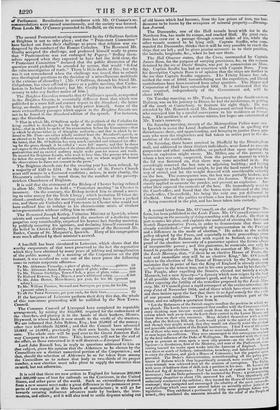It is said that there are now orders in England
for between 200,000 and 300,000 tons of iron for railroads on the Continent, in the United States, and other parts of the world. Such an extraordinary demand from a new source must make a great difference in the permanent pros- pects of men engaged in this branch of manufacture; it will go far towards securing indiscreet advances made by bankers, the iron- masters, and others; and it will also tend to settle disputes arising out of old leases which bad become, from the low prices of iron, too bur. densome to be borne by the occupiers of mineral property.—Birming. ham Journal.
The Duncombe, one of the Hull vessels beset with ice in the Northern Sea, has made its escape, and reached Hull. By great exer-
tions her crew cut a passage through several miles of ice, while the other vessels seemed to be lying still. Captain Scoffin, who con. mantled the Duncombe, thinks that it will be very possible to reach the ships that are left ; and he gives precise accounts as to their position, the latitude, longitude, &c., when he last saw them.
The Hull Observer states, that the Cove, commanded by Captain James Ross, for the purpose of carrying provisions, &c. to the seamen detained by the ice at Davis' Straits, was put in commission on Mon. day. Captain Scoffin has had an interview with Captain Ross. From his description Captain Ross is of opinion that the ships are further in the ice than Captain Scoffin supposes. The Trinity House has sub- scribed the sum of 1000/. towards fitting out the expedition, and liberal contributions have been received from other quarters. The Mayor and Corporation of Hull have subscribed 100/. It is estimated that the sum required, independently of the Government aid, will be about 4000/.
On Tuesday morning, as Mr. Yeats, Secretary to the South-eastern Railway, was on his journey to Dover, he had the misfortune, in getting off the coach at Canterbury, to fracture his right thigh. Ile was attended by Mr. Renwich until Mr. Honeywood arrived from Isominn, who conveyed him by a careful conveyance to his residence at Streat- ham. The accident is of a serious nature, but hopes are entertained of Mr. Yeats's recovery.
On Saturday morning, twenty of the Metropolitan Police were sen to Ipswich to assist the Local Authorities and Police in quelling the disturbances there, and apprehending, and bringing to justice those per- sons who were the ringleaders and had taken an active part in the de- molition of the workhouse.
On Saturday, three boxes received in Sheffield by the Birmingham mail, and addressed to three distinct individuals, were found to contain gunpowder and other combustibles, so packed that upon opening the boxes an explosion might ensue. Mr. Miller, one of the persons to whom a box was sent, suspected, from the peculiar manner in which the lid was fastened on, that there was some mischief in it. Ile
accordingly removed the box into an adjoining building ; and having fixed a rope to a half-hundred weight, he put the band round a hook by
way of swivel, and let the weight descend with considerable velocity on the box. The consequence was, the box was partially broken, and the gunpowder made its appearance from the fissures. Water was in- stantly applied to saturate the powder, and prevent an explosion. An-
other blow exposed the contents of the box. He immediately went to the Coach-office, and found that the boxes were delivered at the Star Coach-office, Chesterfield; his being the only one yet delivered in Sheffield. One of the parties to whom a box was directed is suspected of being concerned in the plot, and has been taken into custody.


























 Previous page
Previous page